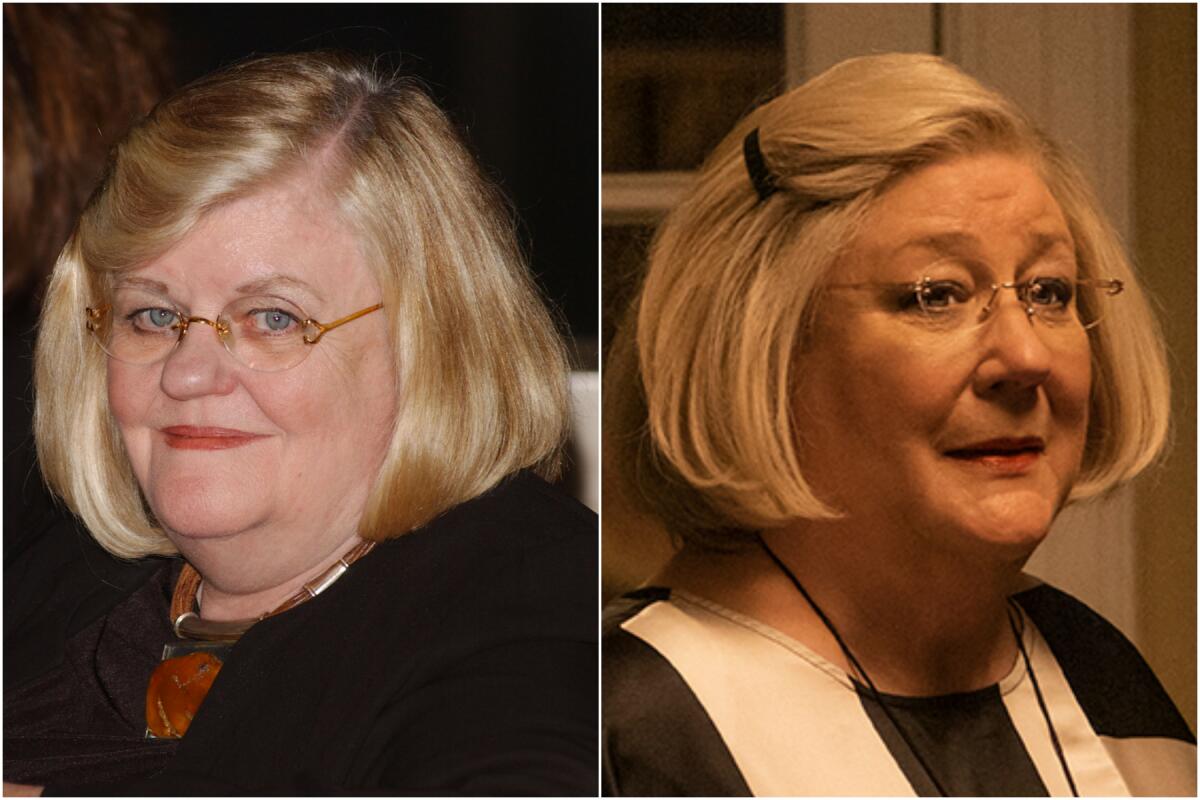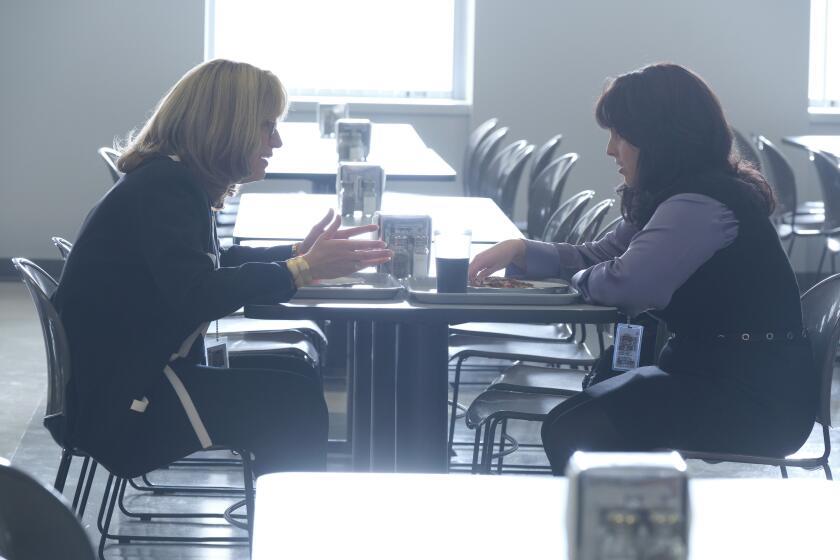The women of ‘Impeachment’ explained: Lucianne Goldberg

Tuesday’s episode of “Impeachment: American Crime Story” marks a turning point in the Clinton impeachment saga: the moment at which former White House secretary Linda Tripp began secretly recording her conversations with former White House intern Monica Lewinsky, then in the midst of a sexual relationship with President Bill Clinton. And New York literary agent Lucianne Goldberg played a crucial role.
TV critic Lorraine Ali and senior editor Matt Brennan break down Episode 4, “The Telephone Hour,” including who Goldberg was, how the Tripp tapes came about, and the appearance of a certain blue dress that would live on in tabloid infamy.
The complete guide to home viewing
Get Screen Gab for everything about the TV shows and streaming movies everyone’s talking about.
You may occasionally receive promotional content from the Los Angeles Times.
Brennan: “The Telephone Hour” is the “Sleepless in Seattle” of TV episodes about American political scandals — or at least that’s the reference that came to mind during a split-screen image of Monica Lewinsky (Beanie Feldstein) and Linda Tripp (Sarah Paulson), laying in their respective beds, talking into the wee hours. But though I knew Tripp’s secret recordings of her conversations with Lewinsky, beginning in late 1997, were central to the impeachment scandal, I hadn’t even heard of Lucianne Goldberg (Margo Martindale) until “Impeachment” — much less understood her importance as a conservative political operator. (Full disclosure: Goldberg’s son, Jonah, is a Los Angeles Times Opinion columnist.)
As we’ve seen in a previous episode, the “gravel-throated, Bill Clinton-hating, world-class gossip” — to quote a Los Angeles Times capsule about Goldberg from 1999 — had already encouraged Tripp to expose Clinton’s improprieties in a book about her time in the administration. Now, in “The Telephone Hour,” Tripp attempts to revive Goldberg’s interest by dangling details of Clinton’s affair with Lewinsky, and Goldberg bites. (The way Martindale stops the cigarette just short of her lips to convey Goldberg’s surprise is simply delicious.) But she tells Tripp that she’ll have to record her conversations with Lewinsky to support her story.
According to a Washington Post report from October 1998, “Impeachment” has the actions right but not the reasons: In the Post’s telling, Goldberg did advise Tripp to record the conversations, but not in order to gather evidence of the affair. Instead she did so because Tripp wanted a way to protect Lewinsky from Clinton lawyer Robert S. Bennett.
There’s also a sequence that shows how Goldberg handed Tripp and Lewinsky on a silver platter to “the elves,” the conservative lawyers you mentioned last week in your discussion of Ann Coulter, and they to Paula Jones’ legal team and, eventually, independent counsel Kenneth Starr.
I could go on forever about the impossibly entertaining convolutions of this show, so before I do let me turn it over to you. Or, as her answering machine says, “You’ve reached the office of Lucianne Goldberg. Start talking.”
This season dramatizes the road to the 1998 impeachment of President Bill Clinton. Here’s our guide to the women at the center of the story.
Ali: At least I know when I’m being recorded. Thank goodness this chat is just between us, Matt. The series continues to grow stronger as the situation devolves, which is a superpower of “American Crime Story” creator Ryan Murphy. The Machiavellian schemes leading to Clinton’s impeachment are now must-see slices of historical drama in his hands, replete with juicy scandals, behind-the-scenes reveals and timely social commentary.
And now that Lucianne’s moving chess pieces, the attention-seeking Tripp is dangerously desperate to get this damn game over with. She wants to be rid of this foreign feeling in her gut. (It’s called empathy, Linda.) And Martindale is fabulous as the wizened agent who’s pushing Tripp toward a devil’s bargain: sacrifice Monica and you’ll have a bestselling book. “The head honcho breaks the presidential seal of an intern. That’s six figures, easy,” she tells Tripp. In “Impeachment’s” rendering, Goldberg has thrown half of Washington under the bus to get what she needed, and run over the other half for fun. What’s not to trust?
But the real star of this week’s episode is the blue dress. There it is, sitting rumpled on the floor of Lewinsky’s closet, next to an era-appropriate Gap bag. She explains to Tripp that she didn’t even notice the stain after her date with The Big Creep (their secret code name for you know who). She later thought it was an errant splash of guacamole, but no. Tripp is appalled and intrigued. “So gross, right?” says Lewinsky. “Well, are you saving it?” asks Tripp. Lewinsky explains she hasn’t had time to dry-clean it. “I just use Dryel,” Tripp replies.
I mean, how did they get through that scene without dissolving into peals of laughter?
After reclaiming Marcia Clark, the actor expected her latest role to change minds about ‘the most hated woman in America.’ She may have miscalculated.
Brennan: I certainly screamed at that line, even if Feldstein and Paulson did not. The episode is chock full of such comic moments. Like Clinton’s secretary, Betty Currie (Rae Dawn Chong) telling a despondent Lewinsky that the president is “watching ‘GI Jane’ with Chelsea and he cannot be disturbed.” Or Lewinsky quitting her job at the Department of Defense the moment she receives a mere interview at Revlon, secured with the help of Clinton ally and civil rights activist Vernon Jordan (Blair Underwood).
In this, “Impeachment” does a great job of illustrating the absurdities not only of the scandal itself, but of American political culture writ large. The more things change, the more they stay the same, and if the appearance of Coulter, Matt Drudge, George Conway and Laura Ingraham in Episode 3 connect the “vast right-wing conspiracy” of the Clinton years to the present, the scene in Episode 4 in which Goldberg facilitates a meeting about the tapes between Tripp and Newsweek reporter Michael Isikoff (Danny A. Jacobs) connects it to the deeper past. Holding court at her D.C. “safe house” (“my son Jonah’s place”), Goldberg brags about securing a spot on the McGovern campaign in 1972: “Remember Nixon?” she says. “You’re welcome.”
As you pointed out when we were discussing the episode on Slack, it also features some truly heartbreaking moments, and I think the comic relief actually plays a key role in that. In a way, “Impeachment” seems determined to emphasize just how much tabloid details and late-night jokes managed to obscure the real story here: on the one hand, the real pain the women at the center of the scandal suffered, and on the other, the craven way that pain was turned into a partisan tool by conservatives. Much is made by both Goldberg and Tripp in the episode of how much Monica’s well-being is their foremost concern, but it never once reads as more than lip service.
At its heart, “Impeachment: American Crime Story” is a story of human foibles. But you may need a timeline to keep straight key developments in the saga.
Ali: And lip service is all it is. Lewinsky, and to an extent Jones, are pawns in everyone’s game. The right sees them as weapons against Clinton, the media considers them front-page scoops. Democrats want to protect their party’s leader by paying for the women’s silence while fixers like Currie and Jordan see cleaning up Clinton’s messes as a way to remain in favor with the most powerful man in the world.
One of the more disturbing moments in the episode comes at the end of Lewinsky’s meeting with Jordan: the affable advisor makes her feel valuable, even respected, then smacks her ass as she steps in the elevator to leave. The disillusionment on her face, knowing she’d been played again, was painful to see, even though he wasn’t holding the meeting at her behest. Of course he wasn’t! But she’s so naive she doesn’t know that, and that inexperience comes up as a theme in her life.
When Lewinsky recounts her past “relationships” during a girl-talk session with Tripp, she recalls being pursued by a high school drama teacher named Andy — who she says had previously had sex with one of her friends — when she was still his student. (Andy Bleiler, Lewinsky’s high-school drama instructor, came forward after the Lewinsky/Clinton scandal broke in early 1998 to proclaim that he and Lewinsky had a years-long sexual relationship, but said it began after she started college.) Lewinsky also describes to Tripp her rape, at age 14, at the hands of a camp counselor. It’s tragic. Her backstory illustrates the series’ consistent theme: women being abused and used by men in power.
By the episode’s close, it’s dawning on Bill that his bad behavior is coming home to roost. He steps into the bedroom where Hillary is sleeping and sits across from her in silence. Enter the next woman in this American crime story, a figure bold enough to push the narrative in a whole new direction.
More to Read
The complete guide to home viewing
Get Screen Gab for everything about the TV shows and streaming movies everyone’s talking about.
You may occasionally receive promotional content from the Los Angeles Times.











